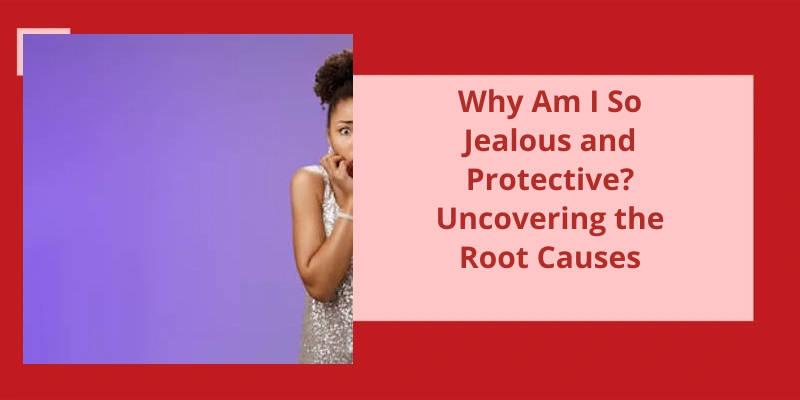At it’s core, jealousy is often fueled by a deep-seated fear of inadequacy and a constant need for validation. People who’re prone to intense jealousy frequently compare themselves to others, constantly feeling as though they fall short or aren’t good enough. This fear of not measuring up creates a distorted perception of reality, leading individuals to believe that any perceived threat, whether real or imagined, will result in the loss of something they hold dear. These feelings of fear and insecurity can manifest in overly protective behavior, as individuals attempt to control their environment and prevent potential sources of jealousy from infiltrating their lives. To truly address and overcome these destructive patterns, it’s crucial to uncover the root causes and work towards fostering self-love, self-acceptance, and a healthy sense of personal worth.
What Emotion Drives Jealousy?
Jealousy is a complex emotion that can stem from various underlying causes. By taking the time to delve into and address these insecurities, we can ultimately find relief in the long run.
Insecurity can arise from a multitude of sources, such as past experiences of rejection, low self-esteem, or a fear of abandonment. By pinpointing where these insecurities originate, we can begin to unravel the tangled web of jealousy.
Furthermore, addressing these insecurities involves a process of self-reflection and self-improvement. Developing a deeper understanding of ourselves and our triggers allows us to challenge and reframe negative thought patterns. We can gradually replace self-doubt with self-acceptance, fostering resilience and a more secure sense of self.
Moreover, cultivating a sense of trust in ourselves and our relationships is essential. Building trust requires both vulnerability and setting clear boundaries.
Jealousy is a common human emotion that can arise in various relationships, but it’s impact can differ significantly depending on how we handle it. According to Dr. Roberts, a key distinction lies in the way we manage our jealousy. While healthy jealousy is a fleeting experience, toxic jealousy tends to manifest in controlling behaviors that can harm both individuals involved. Identifying and addressing this toxic pattern is crucial for maintaining healthy relationships.
Am I Toxic if I Get Jealous?
Am I toxic if I get jealous? “The biggest difference between healthy and unhealthy jealousy is how we manage it,” Dr. Roberts says. The former is natural, normal, and most importantly, temporary, the latter is “toxic, explosive, and uncompromising, usually indicating a desire to control the other person ,” she explains.
Feeling a certain level of jealousy in relationships isn’t uncommon and can often be a sign of care and love. However, when jealousy begins to consume your thoughts and actions, it can become toxic. Toxic jealousy is characterized by possessiveness, a constant need for reassurance, and a fear of losing the person you love.
To overcome toxic jealousy, it’s crucial to address the underlying issues at hand. This may involve exploring your own self-worth, building trust within the relationship, communicating openly with your partner, and developing healthy coping mechanisms.
How to Differentiate Between Healthy and Unhealthy Jealousy
- Understanding the difference between healthy and unhealthy jealousy is crucial.
- Healthy jealousy is characterized by feelings of protectiveness and wanting to maintain a strong bond with your partner.
- Unhealthy jealousy, on the other hand, is often irrational and leads to controlling and possessive behaviors.
- In healthy jealousy, communication is key. It allows both partners to express their concerns and work together to address them.
- Unhealthy jealousy, however, is often accompanied by accusations, mistrust, and constant surveillance of your partner.
- A healthy level of jealousy can actually strengthen a relationship by reminding you of the value you place on your partner and the desire to maintain the trust between you.
- Unhealthy jealousy, on the contrary, can lead to the deterioration of the relationship due to constant tension and lack of trust.
- Recognizing the signs of unhealthy jealousy is important to address the issue and seek professional help if necessary.
- Healthy jealousy involves accepting that your partner has a life outside of the relationship and allowing them to maintain their individuality.
- Unhealthy jealousy often involves attempts to isolate your partner from friends, family, and other social connections.
Navigating and understanding our emotions can be a complex journey, particularly when it comes to feelings of possessiveness and jealousy. While possessiveness may stem from a sense of ownership, it can often overlap with jealousy, which is born out of a fear of losing the attention or affection of someone important to us. In the realm of relationships, possessiveness can often give rise to jealousy, as the desire to maintain control over a partner intersects with the fear of them finding happiness or fulfillment elsewhere.
Am I Possessive or Jealous?
Many people find themselves questioning their possessiveness and jealousy tendencies in relationships. Whether it’s a romantic partnership or a close friendship, these emotions can often arise and leave individuals feeling perplexed. Jealousy, in it’s simplest form, is the feeling of resentment towards someone elses achievements, attention, or affection from another person. It stems from a deep desire to be recognized and valued by those who matter to us. It’s natural to experience jealousy when a friend or family member surpasses us in life or receives more recognition.
On the other hand, possessiveness refers to an intense liking or attachment to things or people that one feels they own or have a claim over. This can manifest as a need for constant validation, monitoring the actions and interactions of their partner, or even making ultimatums to maintain control.
By exploring and acknowledging these factors, individuals can begin to work towards developing healthier coping mechanisms and building their self-confidence. Creating a supportive and understanding environment where emotions can be expressed and addressed can be transformative in breaking free from these patterns of behavior.
With time, effort, and the support of loved ones, it’s possible to move towards healthier and more fulfilling relationships built on trust and mutual respect.
Seeking Professional Help for Possessiveness and Jealousy Issues
- Find a qualified therapist or counselor specializing in relationship issues
- Discuss your concerns and goals with the therapist
- Attend regular therapy sessions to address possessiveness and jealousy
- Engage in open and honest communication with your partner
- Practice self-reflection and identify any underlying insecurities
- Work on building trust and creating boundaries in your relationship
- Seek support from friends or a support group who understand your struggles
- Consider reading self-help books or articles on overcoming possessiveness
- Engage in individual self-care activities to promote self-confidence
Source: What’s the difference between possessive and jealous?..
Conclusion
and fear of being replaced. These deep-seated fears can stem from various sources, such as childhood experiences, past traumas, or even societal norms and expectations. Therapy, self-reflection, and open communication with loved ones can all play a vital role in helping individuals break free from the grip of jealousy and cultivate healthier, more fulfilling relationships.






